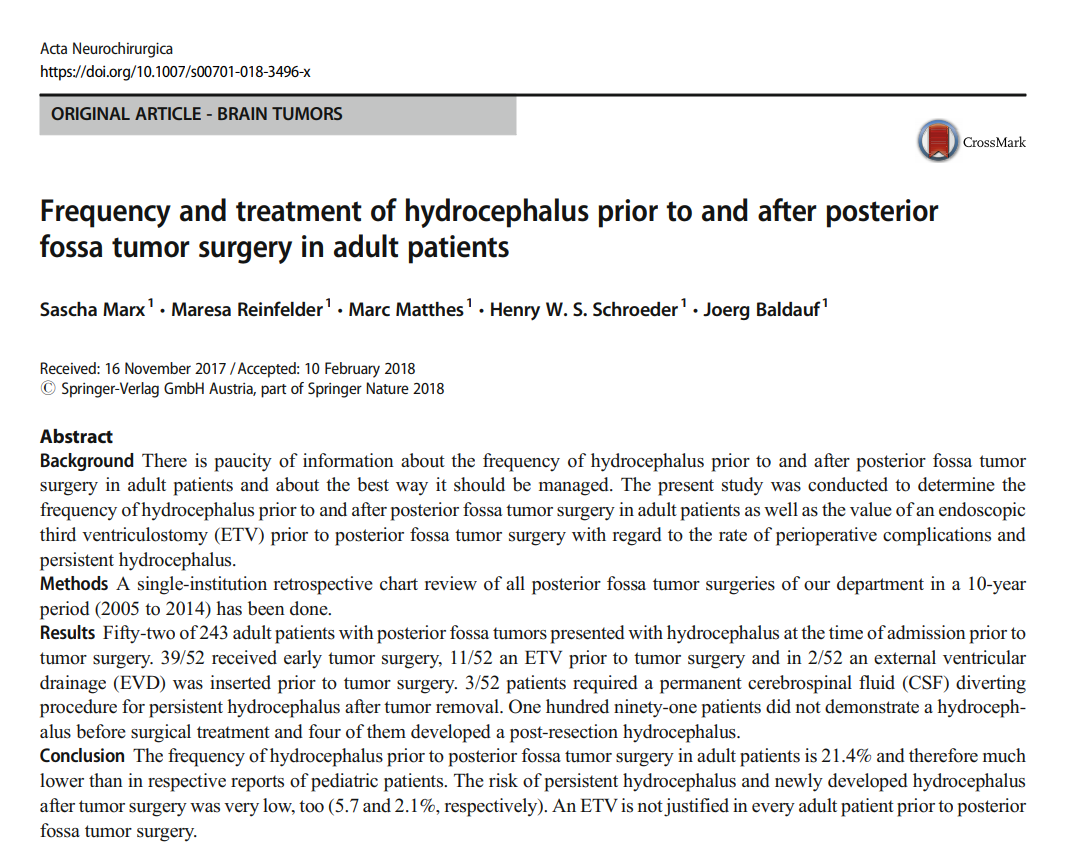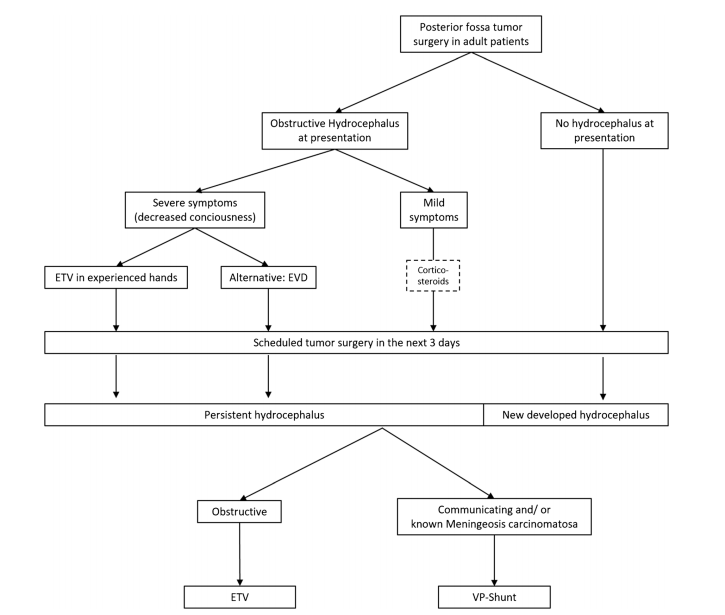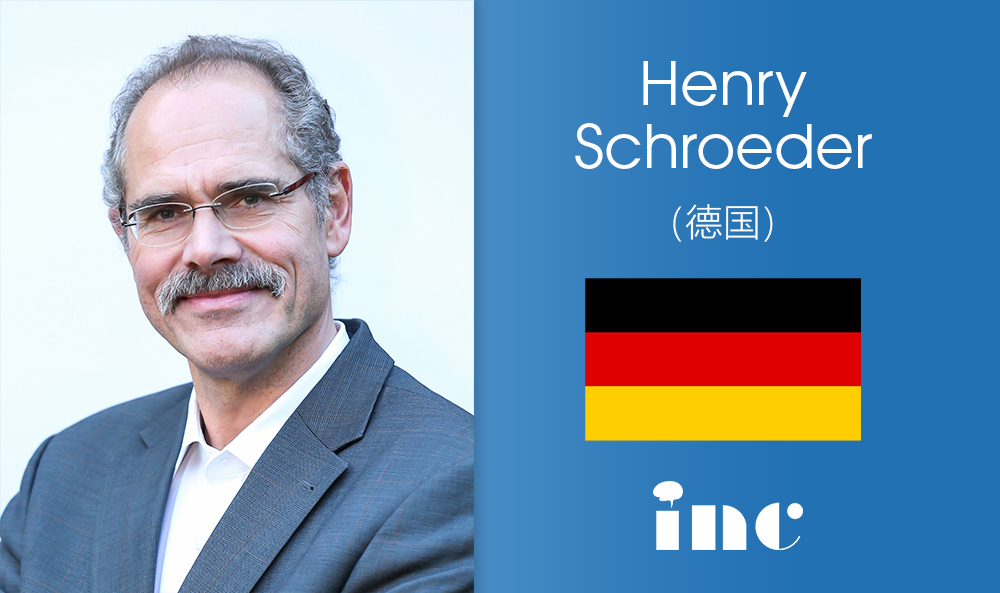Abstract
Background:There is paucity of information about the frequency of hydrocephalus prior to and after posterior fossa tumor surgery in adult patients and about the best way it should be managed.The present study was conducted to determine the frequency of hydrocephalus prior to and after posterior fossa tumor surgery in adult patients as well as the value of an endoscopic third ventriculostomy(ETV)prior to posterior fossa tumor surgery with regard to the rate of perioperative complications and persistent hydrocephalus.
Methods:A single-institution retrospective chart review of all posterior fossa tumor surgeries of our department in a 10-year period(2005 to 2014)has been done.
Results:Fifty-two of 243 adult patients with posterior fossa tumors presented with hydrocephalus at the time of admission prior to tumor surgery.39/52 received early tumor surgery,11/52 an ETV prior to tumor surgery and in 2/52 an external ventricular drainage(EVD)was inserted prior to tumor surgery.3/52 patients required a permanent cerebrospinal fluid(CSF)diverting procedure for persistent hydrocephalus after tumor removal.One hundred ninety-one patients did not demonstrate a hydrocephalus before surgical treatment and four of them developed a post-resection hydrocephalus.
Conclusion:The frequency of hydrocephalus prior to posterior fossa tumor surgery in adult patients is 21.4%and therefore much lower than in respective reports of pediatric patients.The risk of persistent hydrocephalus and newly developed hydrocephalus after tumor surgery was very low,too(5.7 and 2.1%,respectively).An ETV is not justified in every adult patient prior to posterior fossa tumor surgery.

背景:关于成人后颅窝肿瘤手术前后脑积水的发生率以及治疗的较佳方法的信息很少。本研究旨在确定成人后颅窝肿瘤手术前后脑积水的发生率,以及后颅窝肿瘤手术前内镜三脑室造口术(ETV)对围手术期并发症和持续性脑积水发生率的价值。
方法:对我科2005~2014年10年间全部后颅窝肿瘤手术进行单机构回顾性分析。
结果:243例成人后颅窝肿瘤患者中,52例在肿瘤手术前入院时出现脑积水。39/52接受早期肿瘤手术,11/52在肿瘤手术前使用ETV,2/52在肿瘤手术前插入体外心室引流(EVD)。3/52例肿瘤切除术后持续性脑积水需行长期性脑脊液(CSF)分流术。191例患者在手术治疗前没有表现出脑积水,其中4例在手术后出现脑积水。

结论:成人后颅窝肿瘤手术前脑积水发生率为21.4%,明显低于相应的儿童病例报告。肿瘤术后持续性脑积水和新发脑积水的风险也很低(分别为5.7%和2.1%)。在后颅窝肿瘤手术前,并非每个成年患者都能接受ETV治疗。
关于德国Henry W.S.Schroeder教授

以神经内镜技术处理垂体瘤、颅咽管瘤、部分脑膜瘤等神经外科疾病,具有创伤小、顺利度高、等优点,很多只需要经鼻蝶入路操作即可,不用经过脑内,对额颞叶的脑组织也不会出现损伤。而在国际范围内,INC国际神经外科医生集团旗下国际神经外科顾问团的德国Henry W.S.Schroeder教授正是尤擅神经内镜准确顺利切除的国际教授专家之一。
Henry W.S.Schroeder教授作为德国以及国际神经内镜专家,在国际神经外科学界享有盛名。他经常作为特邀讲师指导国内神经外科专家开展垂体瘤、脑膜瘤等神经内镜手术技术培训,普及神经内镜手术在国内的应用,与国内神经外科专家共同交流进步。Schroeder教授还和德国其他教授一起合著、编纂了《神经内镜手术》一书。在神经内镜设备领域出名的小儿神经内镜Lotta内镜就是Schroeder教授在2004年发明并用自己的女儿Lotta名字命名的。
原文链接:https://www.sci-hub.pl/10.1016/j.neuroscience.2020.06.035




